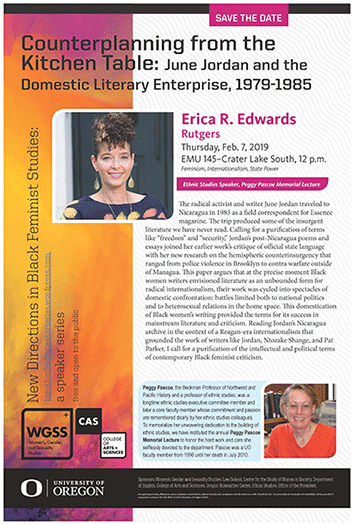| February 7, 2019 | ||
| 12:00 pm | to | 1:30 pm |
EMU 145: Crater Lake South. University of Oregon
New Directions in Black Feminist Studies Speaker Series
Ethnic Studies Speaker, Peggy Pascoe Memorial Lecture Speaker
Speaker: Dr. Erica Edwards (Rutgers) “Counterplanning from the Kitchen Table: June Jordan and the Domestic Literary Enterprise, 1979-1985”
Join us for the next talk in the New Directions in Black Feminist Studies Speaker Series, organized by Dr. Shoniqua Roach.
Speaker Bio: Dr. Erica Edwards is an associate professor of English at Rutgers University. She is an expert in African American literature and culture and the author of Charisma and the Fictions of Black Leadership (University of Minnesota Press, 2012). Edwards is currently at work on her book “The Other Side of Terror: Blackness and the Culture of US Empire,” which argues that the making of US empire as a way of life throughout the long war on terror has transformed contemporary black writing. Edwards is the recipient of awards and fellowships from the Andrew W. Mellon Foundation, the Modern Language Association, and the Woodrow Wilson National Fellowship Foundation.

Talk abstract: The radical activist and writer June Jordan traveled to Nicaragua in 1983 as a field correspondent for Essence magazine. The trip produced some of the insurgent literature we have never read. Calling for a purification of terms like “freedom” and “security,” Jordan’s post-Nicaragua poems and essays joined her earlier work’s critique of official state language with her new research on the hemispheric counterinsurgency that ranged from police violence in Brooklyn to contra warfare outside of Managua. This paper argues that at the precise moment Black women writers envisioned literature as an unbounded form for radical internationalism, their work was cycled into spectacles of domestic confrontation: battles limited both to national politics and to heterosexual relations in the home space. This domestication of Black women’s writing provided the terms for its success in mainstream literature and criticism. Reading Jordan’s Nicaragua archive in the context of a Reagan-era internationalism that grounded the work of writers like Jordan, Ntozake Shange, and Pat Parker, I call for a purification of the intellectual and political terms of contemporary Black feminist criticism.


